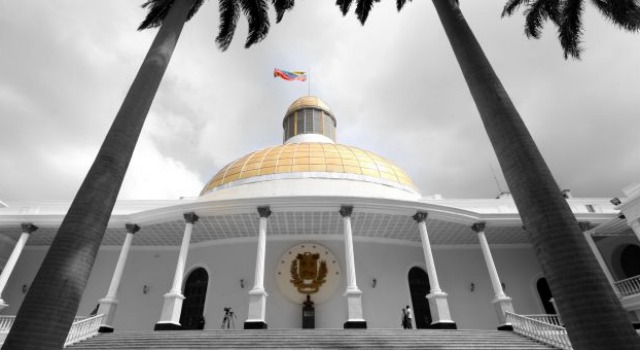The judgment came a few minutes the bell ring. The same day the National Assembly -controlled by the opposition- planned to approve a report to override the appointment of 34 Justices of the Supreme Tribunal of Justice, the Constitutional Chamber passed a judgment in order to deny the legality of the initiative and, moreover, limit the powers of the Legislative Branch.
The Constitution’s interpretation recourse was introduced in the highest tribunal on 17 February 2016. Three lawyers asked the Justices to define the scope of articles 136, 222, 223 y 265, related to the control and investigation powers held by the Venezuelan parliament. As soon as it received the request, the T.S.J. stepped on the accelerator and published its ruling in the morning of 1° March.
Based on the presentation of the Justice Arcadio Delgado Rosales, the Constitutional Chamber established that the National Assembly could not asses the 34 Justices’ appointment -13 regular Justices and 21 alternate ones- that was made on 23 December 2015. “The Parliament is not entitled to revise, overturn, revoke or terminate the inter-agency Justices appointment process of the Supreme Tribunal of Justice, regulars and alternates, which also involved the Citizen Branch and the Judicial Branch”, they concluded.
The new parliamentary majority fund a number of irregularities which allegedly distorted the appointment of those 34 Justices. The renewal process prompted by the chavismo was completed 17 days after knowing the election results that favored the opposition, when the Legislative Branch had already completed its period of regular sessions. Moreover, among the anointed ones stand out former leaders or activists of the ruling United Socialist Party of Venezuela (PSUV).
Of the seven members of the Constitutional Chamber, three did not sign the judgment. That trio was part of the “promotion” of 23 December 2015: Calixto Ortega, former deputy of the PSUV; Luis Damiani Bustillos, former government minister; and Lourdes Suárez Anderson, sister of prosecutor Danilo Anderson, who was killed in a bomb attack on 18 November 2004.
Straitjacket
Since its inception in 2000, the chavismo dominated the National Assembly. On 6 December 2015, the popular vote granted the opposition the reins of the Assembly. And it is precisely now when the T.S.J. deals with putting the brakes on the parliamentary majority.
The judgment not only prevents the National Assembly to override the appointment of those controversial Justices. It goes far beyond. It indicates that the Parliament’s control functions are restricted “to the Government and the National Public Administration”. In this respect, the presentation of Delgado Rosales “denies that the AN can control other entities of the Public Power, such as the Citizen Branch and the Judicial Branch”, says the expert José Ignacio Hernández.
Although it recognizes the power to examine the Government and the National Public Administration, it also puts it obstacles. “In order to prevent that control from affecting the proper functioning of the National Executive, and, consequently, prevent it from ending infringing fundamental rights, the proper coordination of the National Assembly with the Executive Vice-president must be observed”, warns the ruling.
Regarding this conditioning, Hernández says: “It violates the autonomy of the Assembly and subtracts any effectiveness from parliamentary control. It does not make sense that the controlling subject asks permission to the controlled one to exert control. In these terms, the parliamentary control is nothing more than a mere protocol formality”.
In fact, the opinion states that legislators should allow “officials who appear (before the AN), to request and to answer, if possible, in writing, the concerns expressed by the National Assembly or its committees”, and have “the proper understanding of the cardinal reservation of information that could affect the Republic’s stability and security”.
The Constitutional Chamber excludes the National Armed Forces from any parliamentary control del, stating the institution “is subject to control through its Commander-in-Chief and to parliamentary control through the political control exerted over its Commander-in-Chief and supreme hierarchical authority: The President of the Republic (…) Otherwise, the Bolivarian National Armed Forces is subject to constitutional and legal control (through the respective law or laws, within the fundamental framework), as well as the controls emanating from the Citizen Branch and the Judicial Branch”.
Likewise, it disavows articles of the Law on the Regime for the Appearance of Officials and individuals before the National Assembly, and of the Assembly’s Internal and Debates Regulation. “The judgment virtually eliminates the legal regime that guarantees the proper functioning of the National Assembly’s control functions”, Hernández says.
Extract of the judgment
(…) the parliamentary control is limited to the National Executive; (…) the parliamentary investigations related to the Judicial Branch are restricted, as regards the Judiciary, on one side, to the verification of conditions for the appointment of Justices (article 264 Constitutional), for which the National Assembly will be able to previously carry out the investigations it deems appropriate (previous control) (…) the political-parliamentary control (…) extends basically over the National Executive Branch, and not over the rest of the Public Powers (Judicial, Citizen and Electoral), neither over the regional public power nor the local one (except as provided in article 187.9 eiusdem), (…) as interpreted in articles 159 et seq. of the Constitution. (…) this Chamber declares (…) the absolute and irrevocable nullity of the acts by means of which the National Assembly intends to promote the revision of constitutionally precluded Justices appointment processes and, hence, of the actions by means of which it created the special commission designated to evaluate such appointments, as well as all the actions derived from them, which are, legally and constitutionally, non-existent. (…) the regime of sanctions established in the Law on the Regime for the Appearance of Officials and individuals before the National Assembly, show inconsistencies that are likely to have a negative effect on its constitutionality, which is why this Chamber, in a manner consistent with its previous actions, widely recorded in its jurisprudence, is also forced to displace by diffuse control of the constitutionality the rules established therein”..
